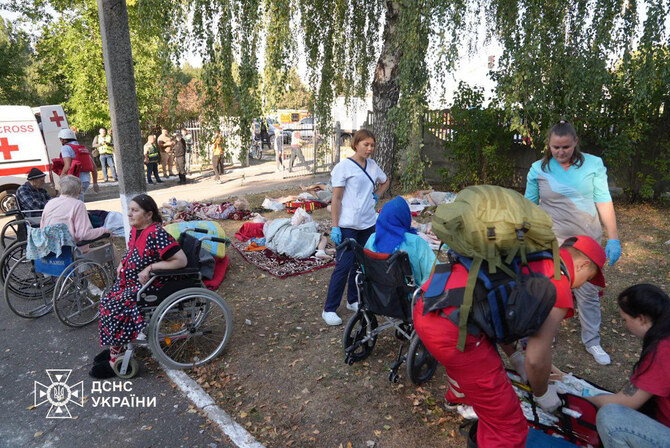KYIV: Russian forces hit a geriatric center in the Ukrainian city of Sumy and targeted its energy sector in a new wave of airstrikes on Thursday, killing at least one civilian, Ukrainian officials said.
A UN monitoring body said attacks on the power grid probably violated humanitarian law while the International Energy Agency said in a report that Ukraine’s electricity supply shortfall in the critical winter months could reach about a third of expected peak demand.
During a daytime strike on the northern city of Sumy, a Russian guided bomb hit a five-story building, regional and military officials said.
One person was killed and 12 wounded, the interior ministry said on the Telegram messaging app.
President Volodymyr Zelensky said rescue teams were checking to see whether people were trapped under rubble.
Images from the site shared alongside the ministry’s post showed elderly patients evacuated from the damaged building lying on the ground on carpets and blankets.
In his nightly video address, Zelensky said that Russia had launched 90 guided bomb attacks in the past 24 hours
He also said that Ukraine’s forces had “managed to diminish the occupiers’ assault potential in Donetsk region,” though the situation remained difficult in areas subjected to the heaviest attacks, near the cities of Pokrovsk and Kurakhove.
Russia’s Defense Ministry said its forces had captured the village of Heorhiivka, east of Kurakhove.
The General Staff of Ukraine’s military, in an afternoon report, referred to the village as one of several engulfed by fighting. Popular Ukrainian military blog DeepState said the village was in Russian hands.
Overnight, Ukraine’s air force said it had shot down all 42 drones and one of four missiles launched since Russia invaded Ukraine more than 2-1/2 years ago.
Russian forces have pummelled the energy system in the Sumy region in multiple strikes this week, reducing power in some areas and forcing authorities to use back-up power systems.
Ukraine’s energy ministry said power cuts had been in force in 10 regions due to airstrikes and technological reasons.
In a sign of its concern, the European Union said a fuel power plant was being dismantled in Lithuania to be rebuilt in Ukraine, and that electricity exports would also be increased.
The UN Human Rights Monitoring Mission in Ukraine said Russia’s attacks violated international humanitarian law by jeopardizing essential services, including water and heating, while also threatening public health, education and the economy, according to the report.
Kyiv says targeting energy system is a war crime, and the International Criminal Court has issued arrest warrants for four Russian officials and military officers for the bombing of civilian power infrastructure.
Moscow says power infrastructure is a legitimate military target and dismisses the charges as irrelevant.
Sumy a frequent target
Moscow has repeatedly attacked the Sumy region, which borders Russia’s Kursk region, the site of a major Ukrainian incursion in which Kyiv says it seized over 100 settlements. Russian shelling killed three people near Krasnopillia in the Sumy region on Wednesday evening, local prosecutors said. More shelling on Thursday wounded two people and damaged a medical institution, they added.
Russia has taken back two more villages in Kursk, a senior commander said on Thursday, adding that Russian forces were also advancing in eastern Ukraine.
Zelensky, however, said the incursion into Kursk region had succeeded in diverting nearly 40,000 Russian troops to the area.






























